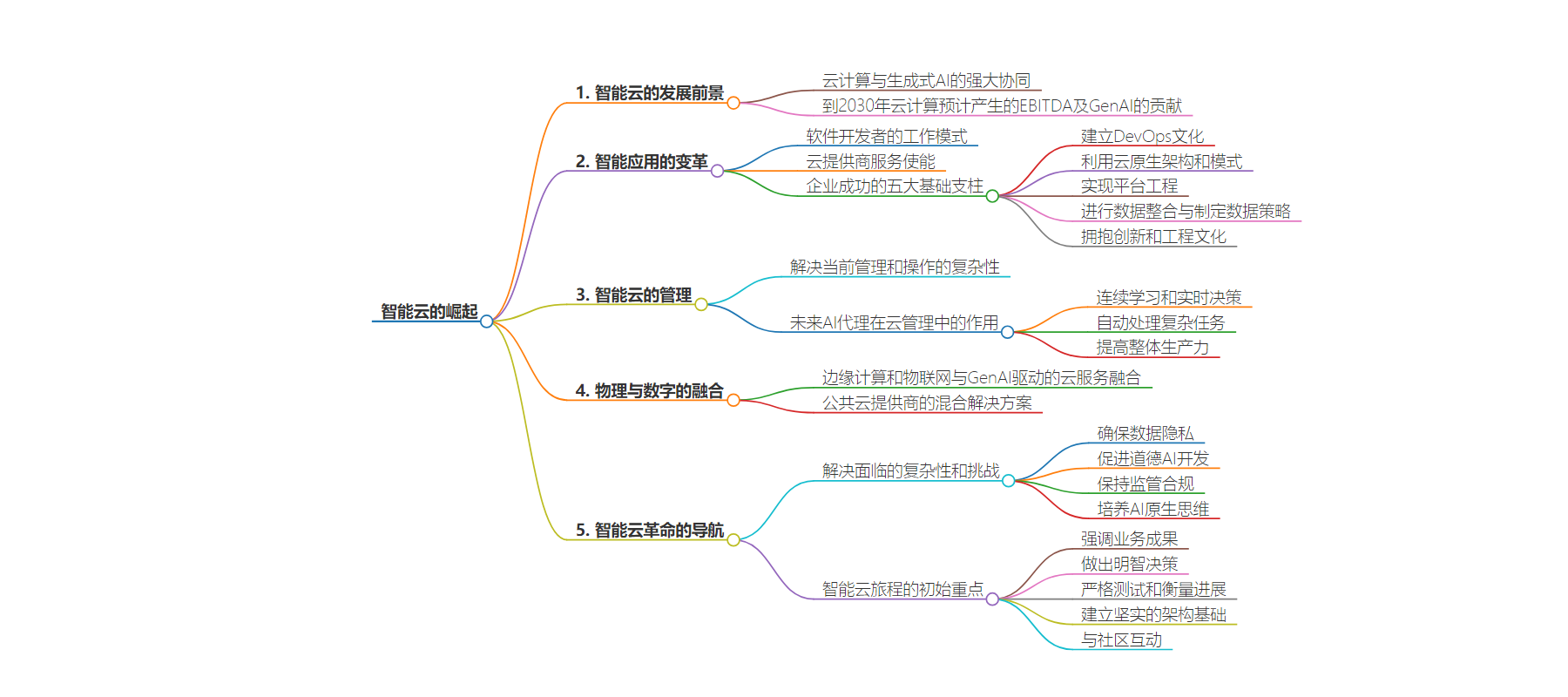包阅导读总结
1. 关键词:智能云、GenAI、云计算、企业转型、技术革命
2. 总结:
本文探讨了智能云的崛起,指出其是生成式 AI 和云计算的强大协同。分析了其对企业云基础设施的影响,如带来新业务案例、降低成本和提高生产力。还提及智能云在应用开发、云管理、物理与数字融合方面的作用,强调应对相关挑战及采取正确策略的重要性。
3. 主要内容:
– 智能云的兴起
– 是生成式 AI 和云计算的协同
– 预测到 2030 年云计算的巨大收益,GenAI 可提高 ROI
– 对企业的影响
– 云架构和策略的转变
– 不同业务的选择取决于具体情况
– 下一代智能应用
– 开发者融合数据、模型和 AI 服务
– 云提供商服务使企业受益
– 企业成功需关注五个基础支柱
– AI 驱动的云
– 解决云管理的复杂问题
– 未来 AI 代理将自动处理任务,提升生产力
– 物理和数字的融合
– 边缘计算和物联网与 GenAI 驱动的云服务融合
– 公共云提供商推进混合方法
– 智能云革命的导航
– 应对复杂挑战,确保数据隐私等
– 培养 AI 原生思维,关注业务成果等
– 采取“爬、走、跑”策略实现成功和投资回报
思维导图:
文章地址:https://thenewstack.io/the-rise-of-intelligent-cloud/
文章来源:thenewstack.io
作者:Subash Natarajan
发布时间:2024/7/9 13:18
语言:英文
总字数:968字
预计阅读时间:4分钟
评分:85分
标签:云计算,生成式人工智能,DevOps,平台工程,自动化云管理
以下为原文内容
本内容来源于用户推荐转载,旨在分享知识与观点,如有侵权请联系删除 联系邮箱 media@ilingban.com
Imagine a world where cloud environments are not just platforms for storage, computation and scalability but are also capable of learning, adapting and evolving. This is the promise of an “intelligent cloud” — the powerful synergy of generative AI and cloud computing. While we stand at the tip of this technological revolution today, let’s ask: How will this synergy reshape enterprises’ building, deployment and management of their cloud infrastructures in the future?
According to a recent McKinsey study, by 2030, cloud computing is projected to generate $3 trillion in EBITDA, with GenAI contributing an additional 75 to 110 percentage points to ROI. This is due to new business use cases, reduced migration costs and enhanced productivity through AI-driven automation and optimization.
As a cloud architect and strategist, most of my conversations are advising a shift toward GenAI. I’m witnessing a powerful synergy developing in this area, promising significant advancements in cloud technologies.
Despite heated debates over on premises vs. cloud, GPU vs. CPU and LLM fine-tuning vs. RAG, the best choice ultimately depends on the individual business and its specific use cases. So, for business leaders, cloud and AI architects, engineers, and anyone excited about the future of cloud with GenAI, this article provides insights into how GenAI is transforming the cloud platform. It offers perspective and holistic guidance to help prepare for the challenges and opportunities on the horizon.
Next-Gen Intelligent Apps: How AI Is Redefining the Landscape
Today, software developers write code while orchestrating a blend of data, models and AI services to create advanced applications. This also includes integrating diverse data sources and leveraging large language models (LLMs). From a platform perspective, cloud provider services such as Microsoft’s Azure AI Studio, Google Vertex AIand Amazon SageMaker are making these capabilities accessible.
For businesses, these tools enable even small startups to deploy sophisticated AI-driven services rapidly. Meanwhile, large enterprises can enhance their analytics with advanced AI models, transforming every stage of application development and deployment.
No doubt, these advancements are crucial, but for enterprises, achieving long-term success also depends on addressing five foundational pillars:
- Building a DevOps culture
- Leveraging cloud native architecture and patterns
- Enabling platform engineering
- Performing data consolidation and having a data strategy
- Embracing a culture of innovation and engineering
The AI-Powered Cloud: From Automation to Autonomous
In today’s landscape, managing and operating the cloud is increasingly complex despite the abundance of automation tools. Ask any DevOps or SRE engineer and they’ll tell you about the challenges of “tool sprawl” or “cloud service sprawl.” Although many organizations strive to standardize and optimize their processes, they often need to add new tools or services that complicate the situation rather than resolve it. Integrating traditional AI with GenAI capabilities in these scenarios presents a promising path forward, simplifying operations and significantly enhancing overall cloud management.
In the near future, AI agents will transform cloud management through continuous learning and real-time decision-making. These intelligent programs will automatically handle tasks like scaling resources during traffic spikes, deploying security measures against threats, and optimizing resource allocation using predictive analytics. By automating these complex operations, AI agents will free DevOps, SRE and operations teams to focus on more strategic, high-value tasks, ultimately boosting overall productivity.
Blurring Boundaries: Physical and Digital Convergence
As cloud and GenAI technologies evolve, the lines between physical and digital will fade. Edge computing and the Internet of Things (IoT), integrated with GenAI-driven cloud services, will forge seamless connections between localized edge data processing and centralized cloud capabilities. This evolution facilitates continuous connectivity between micro clouds (local edge) and macro clouds (public/private cloud environments).
Note: Public cloud providers are already advancing this hybrid approach with solutions such as AWS Outposts, Google Anthosand Azure Stack Edge, which support edge deployments today.
Imagine a factory equipped with IoT sensors to collect performance data, where lightweight LLM models (SLM’s) continuously monitor equipment data, instantly flagging unusual patterns. These on-site models work in tandem with sophisticated cloud-based LLMs, combining rapid local responses with in-depth analysis to optimize manufacturing processes. This dual approach would enable predictive analyses and proactive decision-making, driving new efficiencies and innovations in the coming years.”
Let me stop here and tell you something: This might sound easy and fancy at first glance, but that may not be true; cloud providers and consumers likely must do a lot of work to reach this point.
Navigating the Intelligent Cloud Revolution
While the outlook for the intelligent cloud is optimistic and forward-looking, it is equally essential for us to address the complexities and challenges it presents. Ensuring data privacy, fostering ethical AI development and maintaining regulatory compliance are critical. Most importantly, cultivating an AI-native mindset will be essential to navigate these dynamics.
GenAI is no longer just a technology conversation — it has evolved into a business dialogue, influencing various aspects of business strategy.
The first steps in the intelligent cloud journey should be focused on identifying business value, securing ROI, ensuring a tangible impact early in the journey and focusing more on:
- Emphasizing business outcomes
- Making informed decisions
- Testing rigorously and measuring progress
- Setting a solid architectural foundation, where governance is critical
- Engaging with the community
Call to Action: Always remember that embarking on a transformative journey requires a solid strategy. Adopting a “crawl, walk, run” approach is critical to achieving lasting success and a return on investment.
YOUTUBE.COM/THENEWSTACK
Tech moves fast, don’t miss an episode. Subscribe to our YouTubechannel to stream all our podcasts, interviews, demos, and more.
